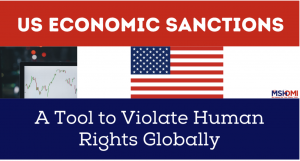
Here are some quotes from CPNN articles that raise this question.
2017: (We are) “convinced that ending the Korean War officially is an urgent, essential step for the establishment of enduring peace and mutual respect between the U.S. and the DPRK, as well as for the North Korean people’s full enjoyment of their basic human rights to life, peace and development – ending their long sufferings from the harsh economic sanctions imposed on them by the U.S. Government since 1950.”
2019: “Alfred de Zayas, the first UN special rapporteur to visit Venezuela in 21 years, told the Independent(1/26/19) that US, Canadian and European Union “economic warfare” has killed Venezuelans, noting that the sanctions fall most heavily on the poorest people and demonstrably cause death through food and medicine shortages, lead to violations of human rights and are aimed at coercing economic change in a “sister democracy.”
2019: “On 3 August 2018, the U.N.’s General Assembly received the report from the U.N.s Independent Expert on the Promotion of a Democratic and Equitable International Order, concerning his mission to Venezuela and Ecuador. . . . The effects of sanctions imposed by Presidents Obama and Trump and unilateral measures by Canada and the European Union have directly and indirectly aggravated the shortages in medicines such as insulin and anti-retroviral drugs. To the extent that economic sanctions have caused delays in distribution and thus contributed to many deaths, sanctions contravene the human rights obligations of the countries imposing them.Moreover, sanctions can amount to crimes against humanity under Article 7 of the Rome Statute of the International Criminal Court.”
2020: Nobel Peace Laureate Mairead Maguire: “The USA should lift sanctions placed on Iran, North Korea, Cuba, etc., and all 54 countries where these sanctions bring death and destruction to citizens, leaving their governments with no money for medicine and food or to help them cope with the coronavirus.”
2020: The People’s Coalition on Food Sovereignty : “International sanctions that include food and agriculture trade are war crimes. Moreover, blanket economic sanctions decimate nation’s livelihoods and developing countries’ international trade relations. Countries like Sudan, Zimbabwe, Iran, Syria, the Democratic People’s Republic of Korea are suffering from sanctions initiated and backed by US and its G20 allies – severely limiting their policy options in facing a pandemic like the coronavirus. In Venezuela and Bolivia, the US tried to put into power political allies using sanctions that created shortages and economic restrictions that the population suffered through within the script of the Hybrid War. The economic and financial embargo imposed by the US against Cuba has impeded export of goods and services, procurement of resources, and trade since 1958. In particular, food trade, access to medicine and medical supplies, and exchange of scientific knowledge were greatly restricted, impacting the Cuban peoples for many decades.”
2021: “The UN Special Rapporteur on unilateral coercive measures and human rights, Alena Douhan, today [12 February] urged the United States, European Union and other States to drop unilateral sanctions imposed against Venezuela. At the end of a two-week visit to Venezuela, Douhan said the sanctions have exacerbated pre-existing calamities. They have resulted in the economic, humanitarian and development crisis, with a devastating effect on the whole population of Venezuela, especially but not only those in extreme poverty, women, children, medical workers, people with disabilities or life-threatening or chronic diseases, and the indigenous populations.”
2022: “The United Nations special rapporteur said the “outrageous” sanctions the West has imposed on Syria are “suffocating” millions of civilians and “may constitute crimes against humanity.” The country’s economy contracted 90%. Nine out of 10 Syrians live in poverty.”
2023: “Mexican president Andrés Manuel López Obrador, said he had personally urged Biden to attack the root causes of migration to the US southern border, namely the “poverty and abandonment” endemic to those countries — and which US sanctions have unquestionably played a major role in causing.”
The sanctions against Cuba are universally condemned by the United Nations and Human Rights organizations. Quoting Wikipedia, “The United Nations General Assembly has passed a resolution every year since 1992 demanding the end of the U.S. economic embargo on Cuba, with the U.S. and Israel being the only nations to consistently vote against the resolutions. . . . Human-rights groups including Amnesty International,[2] Human Rights Watch,[18] and the Inter-American Commission on Human Rights[19] have also been critical of the embargo. . . . In 1997, the American Association for World Health stated that the embargo contributed to malnutrition, poor water access, lack of access to medicine and other medical supplies and concluded that “a humanitarian catastrophe has been averted only because the Cuban government has maintained a high level of budgetary support for a health care system designed to deliver primary and preventative medicine to all its citizens.”
Finally, should sanctions be considered as terrorism? Keep in mind that the definition of terrorism, according to Oxford Dictionary is “the unlawful use of violence and intimidation, especially against civilians, in the pursuit of political aims.”
* * * * * * * * * * * *
This question applies to the following CPNN articles:
Only Israel, the United States, and Ukraine refuse to stand with Cuba
The Washington Consensus Supporting Sanctions on Cuba and Venezuela Is Breaking
The Western Sanctions That Are ‘Choking’ Syria May Be Crimes Against Humanity
UN human rights expert urges to lift unilateral sanctions against Venezuela
People’s Coalition on Food Sovereignty: Nine Demands for Food and Rights
Nobel Laureate Mairead Maguire: Do Not Be Afraid…. All Will Be Well….
What the Press Hides from You about Venezuela — A Case of News-Suppression